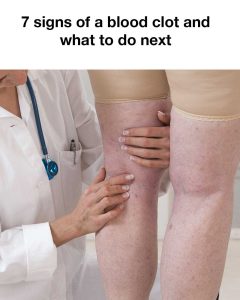
What to Do if You Suspect a Blood Clot
If you notice any of these symptoms, it’s crucial not to ignore them. Avoid massaging the affected area, as it could cause the clot to dislodge. Seek medical help immediately for proper diagnosis and treatment. Early detection is essential to prevent complications.
Seeking Medical Attention
Doctors will use imaging tests, like ultrasound, to confirm the presence of a clot and may perform blood tests. Treatment typically involves anticoagulants (blood thinners) to prevent further clotting. In more severe cases, surgery may be required.
Prevention Measures
To reduce the risk of blood clots, stay active, avoid long periods of immobility, stay hydrated, and manage existing health conditions like obesity or diabetes. If you’re at higher risk, your doctor may recommend blood-thinning medications.
Conclusion
Blood clots can be life-threatening, but recognizing the signs early can save lives. If you suspect a clot, seek medical attention immediately. Prevention through healthy lifestyle choices and regular check-ups is key to reducing your risk. By staying informed, you can protect your health and avoid serious complications.